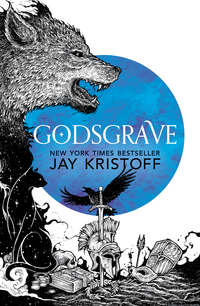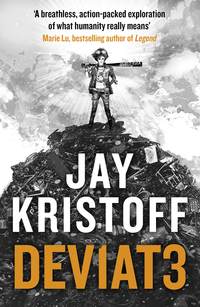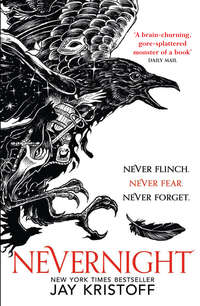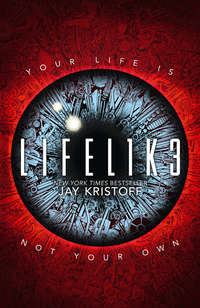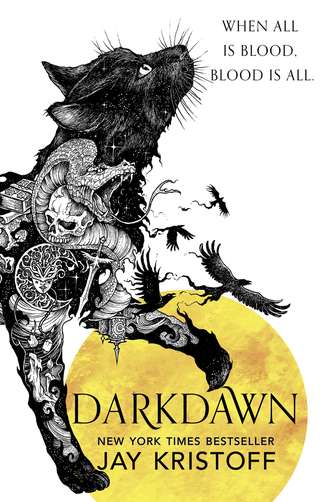
Полная версия
Darkdawn
He’d never made time for familia. To live as a Blade of the Mother was to live with death—with the knowledge that every turn could be your last. It hadn’t seemed fair to take a wife when she’d likely end a widow, nor make a child who’d probably be raised an orphan. Mercurio never thought he’d a need for children. If you’d asked him why he’d taken that raven-haired waif in all those years ago, he’d have muttered something about her gift, her grit, her guile. He’d have laughed if you’d told him he needed her as much as she needed him. He’d have cut your throat and buried you deep if you’d told him that one turn, he’d love her like the daughter he’d never had.
But in his bones, even as he ended you, he’d have known it true.
And now, here he was. A worm on Drusilla’s hook. For all his bluff, he knew the Lady of Blades spoke truth—Mia loved him like blood. She’d never let him die in here, not if she thought she had a chance to save him. And with those wretched daemons riding her shadow and eating her fear, in Mia’s head there was always a chance.
The old man peered at the granite colossus above him. The sword and scales in her hands. Those pitiless black eyes, boring into his own.
“Where the fuck are you?” he whispered.
He left the hall, Drusilla’s Hand lurking at a respectful distance behind as the old bishop shuffled on his way through the Mountain’s maze, his cane beating crisp on the black stone. His knees were aching by the time he reached his destination—he didn’t remember there being quite so many stairs in this place. Two dark wooden doors loomed before him, carved with the same spiral motif as decorated the walls. Each must have weighed a ton, but the old man reached out with one gnarled hand and pushed them open with ease.
Mercurio found himself on a mezzanine overlooking a forest of ornate shelves, laid out like a garden maze. They stretched off into a space too dark and vast to see the edges. On each shelf were piled books of every shape and size and description. Dusty tomes and vellum scrolls and famished notebooks and everything in between. The grand Athenaeum of the Goddess of Death, peopled with the memoirs of kings and conquerors, theorems of heretics, masterpieces of madmen. Dead books and lost books and books that never were—some burned on the pyres of the faithful, some simply swallowed by time, and others simply too dangerous to write at all.
An endless heaven for any reader, and a living hell for any librarian.
“Well, well,” said a croaking, hollow voice. “Look what the scabdogs dragged in.”
Mercurio turned to see an old Liisian man in a scruffy waistcoat, leaning on a trolley piled with books. Two shocks of white hair sprung from either side of his scalp, and a pair of finger-thick spectacles adorned his hooked nose. His back was so bent, he looked like a walking question mark. A fine cigarillo smoldered on his bloodless lips.
“Hello, Chronicler,” Mercurio said.
“You’re a long way from Godsgrave, Bishop,” Aelius growled.
The chronicler stepped closer, squared up against Mercurio, and glowered. As they stood there, face-to-face, Aelius seemed to stand taller, his shadow growing longer. The air rippled with some dark current, and Mercurio heard the shapes of colossi moving out between the shelves. Coming closer.
Aelius’s dark eyes burned as he considered Mercurio’s, his voice growing harder and colder with every word.
“If I can still call you ‘Bishop’ at all, that is,” he spat. “I thought you’d be ashamed to show your face outside your bedchamber after what you pulled. Let alone drag yourself down here. What brings your traitorous hide to the Black Mother’s library?”
Mercurio pointed to the ever-present spare behind the chronicler’s ear.
“Smoke?”
Chronicler Aelius hung still for a moment, eyes burning with dark flame. Then, with a small chuckle, he unfolded his arms, clapped Mercurio on his thin shoulder. Lighting the cigarillo on his own, he handed it over.
“All right, whippersnapper?”
“Do I look all right, old man?” Mercurio asked.
“You look like shite. But it’s always polite to ask.”
Mercurio leaned against the wall and gazed out over the library, dragging a sweet gray draft into his lungs. The smoke tasted of strawberries, the sugared paper setting his tongue dancing.
“They don’t make them like this anymore,” Mercurio sighed.
“Same might be said of everything in this room,” Aelius replied.
“How’ve you been, you old bastard?”
“Dead.”[3]
The chronicler settled in beside him.
“You?”
“Much the same.”
Aelius scoffed, breathed a plume of gray. “Still got a pulse in you from what I can see. What the ’byss you sulking about down here for, lad?”
Mercurio drew on his cigarillo. “It’s a long story, old man.”
“A story about your Mia, I take it?”
“… How’d you guess?”
Aelius shrugged his bone-thin shoulders, his eyes twinkling behind his improbable spectacles. “She always struck me as a girl with one to tell.”
“We might be nearing the final page, I fear.”
“You’re too young to be such a pessimist.”
“I’m sixty-fucking-two,” Mercurio growled.
“As I say, far too young.”
Mercurio found himself chuckling, warm gray spilling from his lips. He leaned back against the wall, feeling the smoke buzz in his blood.
“How long have you been down here, Aelius?”
“O, a while,” the chronicler sighed. “Never saw much sense in counting the years, though. It’s not as though I really have a choice about when I leave.”
“The Mother keeps only what she needs,” Mercurio murmured.
“Aye.” Aelius nodded. “She does at that.”
Mercurio tilted his head back, looked out on all those dead books with heavy-lidded eyes. “Do you hate her for it?”
“Blasphemy,” the old ghost scolded.
“Is it?” Mercurio asked. “If she doesn’t care what we say or do?”
“And what makes you say that?”
“Well, look at what this place has become,” Mercurio growled, waving his cane at the dark. “Once, it was a house of wolves. Each murder, an offering to Our Lady of Blessed Murder. Feeding her hunger. Making her stronger. Hastening her return. And now?” He spat on the flagstones. “It’s a whorehouse. The Ministry feed their own coffers, not the Maw. Their hands drip with gold, not red.”
Mercurio shook his head, breathing smoke as he continued.
“O, we say all the words, make all the gestures, aye. ‘This flesh your feast, this blood your wine.’ But still, when all the praying is done, we drop to our knees for the likes of Julius fucking Scaeva. How can you say Niah cares, if she allows this poison to fester in her own halls?”
“Maw’s teeth.” Aelius raised one snow-white brow. “Someone woke up on the wrong side of bed this morn.”
“Fuck off,” the old man spat.
“What do you want her to do?” the chronicler demanded. “She’s been banished from the sky for millennia, boy. Allowed to rule for a handful of turns every two and a half years. How much say over all this do you think she has? How much influence do you think she can exert in the prison her husband made for her?”
“If she’s so powerless, why call her a goddess at all?”
Aelius’s frown deepened into a scowl. “I never said she was powerless.”
“Because you were never one to state the fucking obvious.”
The chronicler looked at Mercurio hard. “I remember when you first arrived here, boy. Green as grass, you were. Soft as baby shite. But you believed. In her. In this. The brighter the light, the deeper the shadow.”
Mercurio scowled. “I’ve as much need for old Ashkahi proverbs as I have for a second ballsack, old man.”
“You might have more need than you know, with young Drusilla on the prowl,” Aelius smirked. “Point is, you had faith, boy. Where’d it go?”
Mercurio pressed the cigarillo to his lips, thinking long and hard.
“I still believe,” he replied. “The God of Light and Goddess of Night and their Four fucking Daughters. I mean, this place exists. You exist. The Dark Mother obviously still has some small sway.” Mercurio shrugged. “But this is a world ruled by men, not divinities. And for all the blood, all the death, all the lives we’ve taken in her name, she’s still so fucking far away.”
“She’s closer than you think,” Aelius said.
“I swear by all that’s holy, if you tell me she dwells in the temple of my heart, we’re going to find out if folk can return from the dead twice.”
“They can’t, actually,” the chronicler shrugged. “Not even the Mother has that power. You die once, you might make it back with her blessing. But cross back over to the Abyss once more? You’re gone forever.”
“That threat was supposed to be rhetorical, old man.”
Aelius grinned, smudged his cigarillo out against the wall, and dropped the butt into the pocket of his waistcoat. “Come with me.”
The chronicler leaned on his RETURNS trolley, began wheeling it down the long ramp from the mezzanine to the Athenaeum floor below. Mercurio watched the old man shuffling away, dragging on his own smoke.
“Come on, whippersnapper!” Aelius barked.
The bishop of Godsgrave sighed and, pushing himself off the wall, followed the chronicler down the ramp into the library proper. Side by side, the pair wandered through the maze of shelves, mahogany and parchment and vellum all around. Every now and then, Aelius would stop and place one of his returned tomes back into its allotted place, almost reverently. The shelves were too tall to see over, and each aisle looked much the same. Mercurio was soon hopelessly lost, and a part of him wondered how in the Mother’s name Aelius made sense of this place.
“Where the ’byss are we going?” he grumbled, rubbing his aching knees.
“New section,” Aelius replied. “They pop up all the time in this place. When they want to be found, that is. I stumbled onto this one almost two years ago. Right before your girl arrived here for the first time.”
Out in the dark, Mercurio could hear bookworms shifting their massive bulks among the shelves. Leathery hides scraping along the stone, deep, rumbling growls reverberating through the floor. The air was dry and cool, echoing with the faint song of that beautiful choir. There was a peace to this place, no doubt. But Mercurio wondered if he’d manage an eternity in it with quite as much calm as Aelius.
They turned down a long shelf, twisting off in a gentle curve. As they walked the rows of dusty tomes wrapped in old skins and polished wood, Mercurio realized the curve was slowly tightening—that the shelf was turning in an eversmaller spiral. And somewhere near the heart of it, out in all that dark, Aelius came to a stop.
The chronicler reached up to the top shelf, pulled down a thick book, and placed it in Mercurio’s hands.
“The Mother keeps only what she needs,” he said. “And she does what she can. In the small ways that she can.”
Mercurio raised an eyebrow, cigarillo still smoldering at his lips as he examined the tome. It was bound in leather, black as a truedark sky. The edges of the pages were stained blood-red, and a crow in flight was embossed in glossy black on the cover.
He opened the book, looked down to the first page.
“Nevernight,” he muttered. “Stupid name for a book.”
“Makes for interesting reading,” Aelius said.
Mercurio opened the book to the prologue, rheumy eyes scanning the text.
CAVEAT EMPTOR
People often shit themselves when they die.
Their muscles slack and their souls flutter free and everything else just … slips out. For all their audience’s love of death, the playwrights seldom—
Mercurio flipped through a few more pages, softly scoffing.
“It has footnotes? What kind of wanker writes a novel with footnotes?”
“It’s not a novel,” Aelius replied, sounding wounded. “It’s a biography.”
“About who?”
The chronicler simply nodded back to the book. Mercurio flicked through a few pages more, scanning the beginning of chapter three.
… dropped him into the path of an oncoming maidservant, who fell with a shriek. Dona Corvere turned on her daughter, regal and furious.
“Mia Corvere, keep that wretched animal out from underfoot or we’ll leave it behind!”
And as simple as that, we have her name.
Mia.
Mercurio faltered. Cigarillo hanging from suddenly bone-dry lips. His blood ran cold as he finally understood what he held in his hands. Glancing up at the shelves around him. The dead books and lost books and books that never were—some burned on the pyres of the faithful, some swallowed by time, and others …
Simply too dangerous to write at all.
Aelius had wandered off down the twisted row, hands in his pockets and muttering to himself, a trail of thin gray smoke left behind him. But Mercurio was rooted to the spot. Utterly mesmerized. He began flipping faster through the pages, eyes scanning the flowing script, snatching only fragments in his haste.
“The books we love, they love us back.”
“I will give your brother your regards.”
“Who or what is the Moon?” she asked.
Mercurio reached the end, turning the book over and over in his hands. Wondering why there were no more pages and looking around the library of the dead in mute wonder and fear.
“I found another one, too,” Aelius said, returning from farther down the row. “About three months back. Wasn’t there one turn, next turn, there it was.”
The chronicler handed Mercurio another heavy tome. It was similar to the one he already held, but the pages were edged in sky blue rather than blood-red. A wolf was embossed on the black cover instead of a crow. Juggling the first book into the crook of his elbow, he opened the second’s cover and peered at the title.
“Godsgrave,” he muttered.
“Follows on from the first,” Aelius nodded. “I think I liked this one better, actually. Less fucking about at the start.”
The choir sang in the ghostly dark around them, echoing through the great Athenaeum. Mercurio’s hands were shaking, cigarillo falling from his mouth as he fumbled with the first tome, opening it finally to the title page.
And there it was.
NEVERNIGHT
BOOK 1 OF THE NEVERNIGHT CHRONICLE
by Mercurio of Liis
The old man closed the book, looked at Niah’s chronicler with wondering eyes.
“Holy shit,” he breathed.
CHAPTER 4
GIFT
Arkemical globes twinkled in the arched ceilings and the music swelled in Mia’s chest and all around her was pale bone and glittering gold. She stood between her father and mother, little hands clutching theirs, staring down at the dance floor in wide-eyed wonder. Elegant donas in dazzling gowns of red and pearl and black, swaying and twirling in the arms of smooth dons in long frock coats. Delicious food arrayed on silver trays and singing crystal glasses filled with sparkling liqueurs.
“Well, my dove?” her father asked. “What do you think?”
“It’s so beautiful.” Mia sighed.
The little girl could sense people’s eyes on them as they stood there at the top of the winding stairs. The doorman had announced their arrival at the grand palazzo, and all had turned to stare. The dashing justicus of the Luminatii Legion, Darius Corvere. His lovely and formidable wife, Alinne. Her parents made their way through the marrowborn crowd, the pretty smiles, the polite nods, the faces hidden by exquisite Carnivalé masks. The palazzo’s ballroom was filled to bursting, and all of Godsgrave’s finest had been invited to the affair—the election of a new consul always brought out the most beautiful of people.
“Will you dance, my dear?” her father asked.
Alinne Corvere softly scoffed, one hand pressed to her swollen belly. Mia knew the baby would come soon. She hoped it would be a boy.
“Not unless you’ve a barrow stowed under that doublet, husband,” she replied.
“Alas,” Darius replied, reaching beneath the folds of his costume. “I’ve only this.”
Mia’s father presented her mother a blood-red rose, bowing low for the benefit of the onlookers around them. Alinne smiled and took the bloom, inhaling deeply as she regarded her husband. But again, she ran a hand over her belly, demurring with a glance from those dark, knowing eyes.
Mia’s father turned and knelt before her.
“What about you, my dove? Will you dance?”
Mia had been feeling strange all week, truth told. Since truedark had fallen, her belly had been all aflutter, and nothing quite felt the way it should. But still, as her father offered his hand, she couldn’t help but smile, caught up in the warmth of his eyes.
“Yes, Father,” she lisped.
“We should give our congratulations to our new consul,” her mother warned.
“Soon enough,” her father nodded, offering his arm to Mia. “Mi Dona?”
The pair of them swept out onto the dance floor, the other marrowborn revelers parting to let them through. Mia was only nine years old, not yet tall or old enough to dance properly. But Darius Corvere propped her little feet upon his and led her gently to the rush and pull of the music. Mia saw the couples around them smiling, charmed as ever by the handsome justicus and his precocious daughter. She looked about her in wonder, caught up in the song and the dresses and the glittering lights above.
The three suns had sunk below the horizon over a week ago, and the Mother of Night was nearing the end of another brief reign of the sky. Mia could hear the popopopopop of the fireworks in the city beyond, meant to frighten the Night back to the Abyss. All over Godsgrave, folk were huddled about their hearths, waiting for Aa to open his eyes again. But here, in her father’s arms, Mia found she wasn’t afraid at all. Instead of being frightened, she felt safe.
Strong.
Loved.
She knew her father was a handsome man, and she was old enough to note the longing stares of the marrowborn ladies as they watched him sweep past across the ballroom floor. But despite the finest of Godsgrave’s donas (and no few dons) staring after him wistfully, Mia’s father had eyes only for her.
“I love you, Mia.”
“I love you, too.”
“Promise you’ ll remember. No matter what comes.”
She gave him a puzzled smile. “I promise, Father.”
They danced on, twirling across the polished boards to the magikal song. Mia looked to the ceilings high above her, pale and gleaming. The consul’s extravagant palazzo sat at the base of the first Rib, right near the Senate House and Godsgrave’s Spine. The dance floor was a revolving mosaic of the three suns, circling each other just as the dancers did. The building was carved from the gravebone of the Rib itself, same as the longsword at her father’s waist, the armor he wore when he rode to war. The heart of the Itreyan Republic, chiseled from the bones of some long-fallen titan.
Mia peered through the crowd and saw her mother, speaking with a man upon a dais at the end of the room. He was resplendent in robes of brilliant purple, a golden laurel around his brow and golden rings upon his fingers. His hair was thick and dark, his eyes were darker still, and he was—though Mia would never have admitted it—perhaps a little more handsome than her father.
Mia saw her mother bow to the handsome man. An elegant woman seated on the dais looked displeased as the man kissed Alinne Corvere’s hand in turn.
“Who is that, Father?” Mia asked.
“Our new consul,” he replied, his eyeline following hers. “Julius Scaeva.”
“Is he a friend of Mother’s?”
“Of a sort.”
Mia watched as the handsome man placed one hand on Alinne Corvere’s swollen belly. A brief touch, light as feathers. A glance between them, quick as silver.
“I do not like him,” the girl declared.
“No fear, my dove,” the justicus replied. “Your mother likes him well enough for both of you. She always has.”
Mia blinked, looking up at her father with black, narrowed eyes. There was a length of rope about his neck in place of his cravat now, tied in a perfect noose.
“What do you mean?” she asked.
“O, wake up, Mia,” he sighed.
“Father, I—”
“Wake up.”
Wake up.”
Mia felt a hard kick in her belly. A child’s voice, somewhere distant. “Wake up, curse you!”
Another kick, this time into the fresh wound at her shoulder. Mia gasped with pain and opened her eyes, seeing a silhouette leaning over her in the gloom. Without thinking, she lashed out with her good hand, seizing the figure’s throat. It squeaked and thrashed, little fingers digging into her forearm. Only then, through the pain and retreating toxic haze did she recognize …
“… Jonnen?”
She released the boy’s neck as if his skin were scalding metal. Utterly aghast, she reached out to smooth his filthy purple toga.
“O, Jonnen, I’m sor—”
“My name is Lucius!” the boy spat, slapping her hands away.
Mia caught her breath, tried to still her thundering heart. She was horrified at herself—she’d almost hurt him without thinking. Her mind was swimming with pictures of a glittering ballroom and a truedark sky and Scaeva’s hand on her mother’s belly. Of an arena full of people, screaming as she buried her gravebone dagger in Scaeva’s chest. Of Jonnen’s face, pale and horrified as she laid his father low before him.
“I’m sorry,” she repeated. “I didn’t hurt you, did I?”
The boy simply scowled, his eyes as dark and bottomless as Mia’s. She glanced around them, wondering where they might be. A vast black space surrounded them, lit by the glow of a single lantern on the ground beside her. The ghostly light extended only a handful of feet, and beyond that lay a darkness too deep to fathom.
The floor was uneven beneath her, and Mia realized it was made entirely of human faces and hands—stone reliefs, carved from the snow-pale bedrock itself. The faces were all female—all the same woman, in fact—her features beautiful, her tresses long and gently curled. But her expressions were all of anguish, of terror, her stone mouths open wide and silently screaming. The multitude of hands were upturned to the hidden ceiling, as if it were about to collapse.
Mia blinked hard, trying to remember how she got here. She recalled her confrontation with Solis and Hush. That spectral figure who’d rescued her in the Galante necropolis, once more saving her skin among the houses of Godsgrave’s dead. She could still feel Solis’s poison in her veins, though she noted the wound at her shoulder had been bound with a scrap of dark cloth. She still felt sluggish from the toxin, cold from the brittle chill around her. She felt the ache of her wounds and the tug of dried blood crusting on her skin, and somewhere distant, a nameless, shapeless anger. And looking around at that sea of frozen, terrified faces, like the sensation of sound for a man long since deafened, Mia suddenly realized she felt …
Afraid.
She searched the dark about her. Seeking her passengers among those stone hands and open mouths and realizing she couldn’t feel them anywhere. Her skin prickled, her belly rolled, and with a hiss of pain, she forced herself to her feet.


